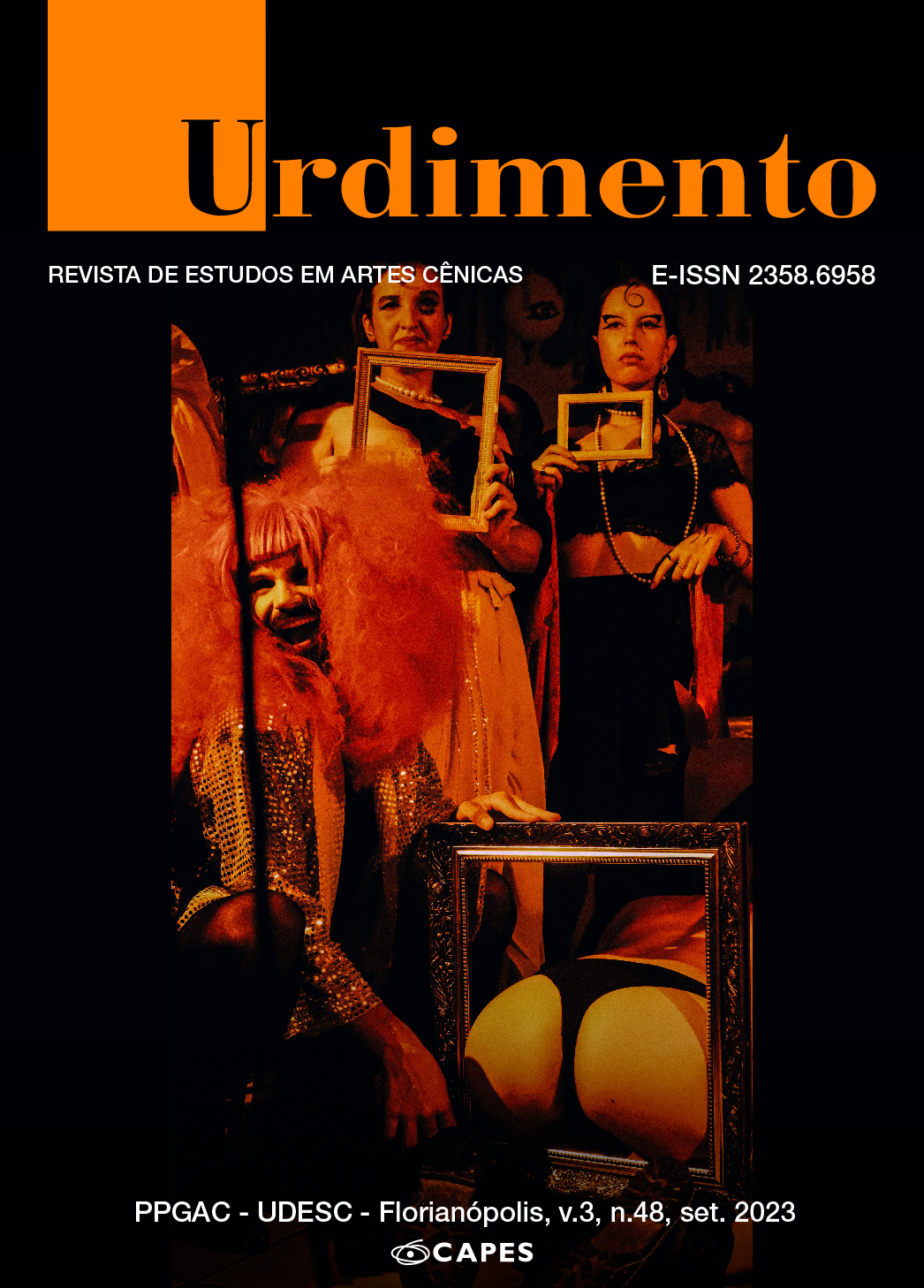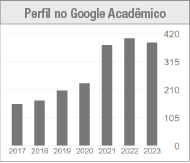The pleasure of the voice
DOI:
https://doi.org/10.5965/1414573103482023e0206Keywords:
voice, pleasure, work, astonishment, contemporary vocalityAbstract
The text develops a reflection within the scope of the relations between voice and experience, discussing the pleasure of the voice, in confrontation with fear and voice work. Along the way, in which the pleasure of the voice leads to pleasure in the theater, the author essays dialogues with the writer Roland Barthes (The pleasure of the text) and theatrical artists, such as Cicely Berry (Voice and the Actor), Isabel Setti (The body of the word it is not fixed, it lets itself be touched by time and its spaces) and Bertolt Brecht (Small Organon for the Theatre). It is an itinerary to meet the pleasure of the voice that vibrates, cuts, historicizes and astonishes.
Downloads
References
AGAMBEN, Giorgio. O que é o contemporâneo e outros ensaios. Chapecó: Argos, 2009, p. 55-76.
ANDRADE, Oswald de. Manifesto Antropófago e Outros Textos. São Paulo: Penguin-Companhia, 2017.
ARENDT, Hannah. A condição humana. Rio de Janeiro: Forense-Universitária, 1987.
ARTAUD, Antonin. Um atletismo afetivo. In: O teatro e seu duplo. São Paulo: Martins Fontes, 2006, p. 151-160.
BARTHES, Roland. O prazer do texto. São Paulo: Perspectiva, 1987.
BERRY, Cicely. Voice and the Actor. Londres: Harrap, 1973.
BETZ, Albrecht. Hanns Eisler Political Musician. London: Cambridge, 1982.
BRECHT, Bertolt. Breviario de estética teatral. Trad. Raúl Sciarreta. Buenos Aires: La Rosa Blindada, 1963a.
BRECHT, Bertolt. Petit Organon pour le Théâtre. In: Écrits sur le Théâtre. Trad. Jean Tailleur, Gérald Eudeline e Serge Lamare. Paris: L’Arche, 1963b.
BRECHT, Bertolt. Pequeno Organon para o Teatro. In: Estudos para uma arte dramática não-aristotélica. Trad. Fiama Hasse Paia Brandão. Lisboa: Portugália, 1964.
BRECHT, Bertolt. Um exemplo: a descrição da primeira representação da peça “A Mãe”. In: Estudos sobre Teatro. Trad. Fiama Hasse Paia Brandão. Rio de Janeiro: Nova Fronteira, 1978, p. 33-36.
CAVARERO, Adriana. Vozes Plurais. Belo Horizonte, UFMG, 2011.
EISLER, Hanns e BUNGE, Hans. Brecht, Music and Culture. Hanns Eisler in conversation with Hans Bunge. London: Bloomsbury, 2014.
FERRARI, Emanuele. Gisele Bretlet e Wagner. In: GONTIJO, Clóvis Salgado e ZILLE, José Antonio Baêta (org.). Os filósofos e seus repertórios – Série Diálogos com o Som. Belo Horizonte: Editora UEMG, Volume 5, p. 127-150, 2019.
I CHING. O livro das mutações. Trad. WILHELM, Richard (chinês para alemão); MUTZENBECHER, Alayde e PINTO, Gustavo (alemão para português). São Paulo: Editora Pensamento, 1982.
LARROSA, Jorge. Herido de realidad y en busca de realidad. Notas sobre los lenguajes de la experiencia. In: DOMINGO, José Contreras y FERRÉ, Núria Pérez de Lara (org.). Investigar la experiencia educativa. Madrid: Morata, 2010, p. 87-116.
LINKLATER, Kristin. Freeing the natural voice. New York: Drama Book Specialists, 1976.
MANDELSTAM, Osip. A Era. In: CAMPOS, Augusto e Haroldo; SCHNAIDERMAN, Boris (organização e tradução). Poesia russa moderna. São Paulo: Perspectiva, 2001. p.210.
MARTINS, José Batista Dal Farra. O ser aprendiz. São Paulo: Giostri, 2020a.
MARTINS, José Batista Dal Farra. Palavra Muda. Sobre poéticas para vozes em Estado de Sítio. São Paulo: Giostri, 2020b.
MARTINS, José Batista Dal Farra. Três fragmentos de ressonância. Porto Alegre: VI Reunião Científica da ABRACE, 2011.
MEYERHOLD. O Amor de Três Laranjas – a revista do Dr. Dapertutto. S. Petesburgo: Livro 1, 1914.
PARDO, José Luis. La Intimidad. Valencia: Pre-Textos, 2004.
PESSOA, Fernando. Poesias. Lisboa: Ática, 1955.
QUILICI, Cassiano. Notas sobre a “Arte como Veículo” e o Ofício Alquímico do Performer. Revista Brasileira de Estudos da Presença, Porto Alegre, v. 3, n. 1, p. 164-175, 2013.
ROSA, João Guimarães. Manuelzão e Miguilim. Rio de Janeiro: Nova Fronteira, 1984.
SCHWARZ, Roberto. O bate-boca das classes. In: BRECHT, Bertolt. A Santa Joana dos Matadouros. São Paulo: Cosac Naify, 2009, p. 7-13.
SETTI, Isabel. O corpo da palavra não é fixo deixa-se tocar pelo tempo e seus espaços. Sala Preta, São Paulo, nº 7, p. 25-32, 2007.
SHAKESPEARE, William. Cymbeline. In: The complete works of William Shakespeare. London: The Hamlyn Publishing Group, 1975.
STANISLAVSKI, Constantin. A Construção da Personagem. Rio de Janeiro: Civilização Brasileira, 2001.
VALENTE, Assis e MAIA, Durval. Alegria. In: PACHECO, Claudia [SIMÕES, Maria]. CD Boca. São Paulo: Abacarô, 1996.
ZARATIN, Terezinha. Comunicação verbal, Educação vocal. O Teatro – Fonte e Apoio. São Paulo: Paulus, 2010.
ZUMTHOR, Paul. Performance, recepção, leitura. São Paulo: Editora da PUC, 2000.
Published
How to Cite
Issue
Section
License
Copyright (c) 2023 Urdimento: Revista de Estudos em Artes Cênicas

This work is licensed under a Creative Commons Attribution 4.0 International License.
Copyright Statement
The articles published by the magazine are free to use. The copyright is all assigned to the magazine. The articles whose authors are identified represent the expression from the point of view of their authors and not the official position of the journal Urdimento. The author (s) undertakes whenever publishing material relating to the article published in Revista Urdimento mention the said publication as follows: This article was originally published by Urdimento magazine in its volume (put the volume), number (put the number) in the year of (put the year) and can be accessed at:
http://www.revistas.udesc.br/index.php/urdimento
This work is licensed under a Creative Commons Attribution 4.0 International License.




